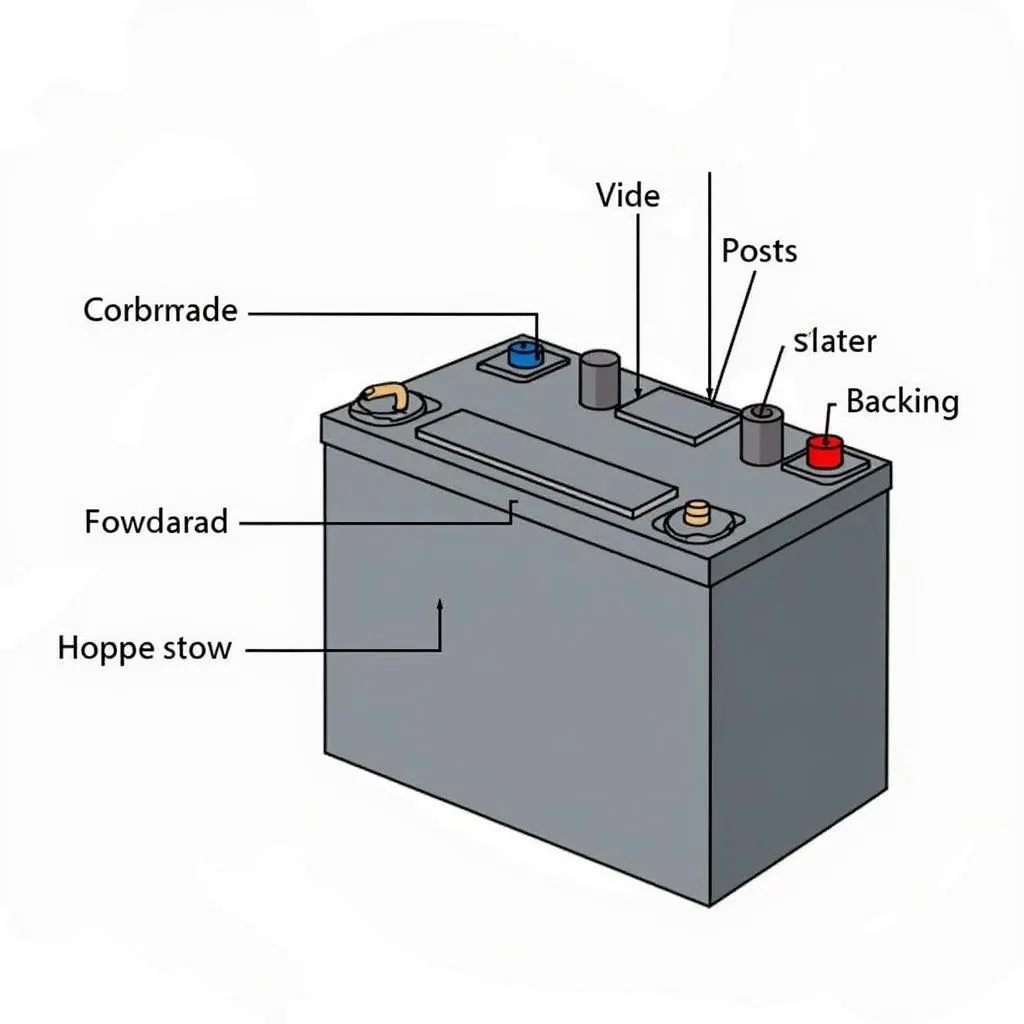Corrosion on car batteries is a common problem that can lead to a variety of issues, including difficulty starting your car, decreased battery life, and even damage to your car’s electrical system. Understanding the causes, symptoms, and solutions for battery corrosion can help you prevent it and keep your car running smoothly.
What Causes Corrosion on a Car Battery?
Corrosion on a car battery is caused by a chemical reaction between the battery terminals, the battery posts, and the surrounding environment. This reaction is accelerated by several factors, including:
- Moisture: Moisture in the air, from rain, snow, or even condensation, can react with the battery’s lead plates and acid to form corrosive substances.
- Heat: Extreme heat can cause the battery’s electrolyte to evaporate, leaving behind a residue that can lead to corrosion.
- Overcharging: Overcharging the battery can cause it to overheat and produce corrosive gases.
- Battery age: As batteries age, their internal components can become damaged, making them more susceptible to corrosion.
- Contamination: Spilled liquids, dirt, or other debris can also contribute to corrosion.
Common Signs of Corrosion on a Car Battery
Corrosion on a car battery can be identified by several telltale signs. Look for:
- White or blue powdery substance: This substance is often found on the battery terminals and posts.
- Green or blue crystals: These crystals can indicate that the corrosion is severe.
- Loose battery terminals: Corrosion can cause the battery terminals to loosen, making it difficult to start the car.
- Battery leaking: A leaking battery is a sign of serious corrosion and damage.
- Dim headlights: Corrosion can cause the battery to lose its charge, leading to dim headlights and other electrical problems.
How to Prevent Corrosion on a Car Battery
Preventing corrosion is essential for keeping your car battery healthy and functioning properly. Here are some tips:
- Keep the battery terminals clean: Regularly clean the battery terminals and posts with a wire brush or a battery terminal cleaner.
- Apply a battery terminal protector: A battery terminal protector can help prevent corrosion by creating a barrier between the terminals and the surrounding environment.
- Check the battery cables: Make sure the battery cables are securely connected to the terminals.
- Keep the battery clean: Avoid spilling any fluids on the battery, and regularly wipe away any dirt or debris.
- Park your car in a covered area: If possible, park your car in a garage or carport to protect it from the elements.
- Use a battery maintainer: A battery maintainer can help keep the battery charged and prevent corrosion.
How to Clean Corrosion from a Car Battery
If you discover corrosion on your car battery, it’s important to clean it immediately. Here’s a step-by-step guide:
- Disconnect the battery: Disconnect the negative terminal first, followed by the positive terminal.
- Protect yourself: Wear safety glasses and gloves to protect your eyes and hands from battery acid.
- Prepare the cleaning solution: Mix a baking soda solution with water (1:1 ratio).
- Apply the solution: Use a toothbrush or wire brush to apply the solution to the battery terminals and posts.
- Rinse: Rinse the battery terminals and posts with clean water.
- Dry: Dry the battery terminals and posts with a clean cloth.
- Apply a protective coating: Apply a battery terminal protector to the terminals and posts.
- Reconnect the battery: Reconnect the battery, ensuring the terminals are securely connected.
When to Replace a Corroded Battery
If the corrosion on your car battery is severe or if the battery is showing other signs of wear and tear, it’s time to replace it.
How to Choose the Right Car Battery
When choosing a new car battery, consider the following factors:
- Battery size: The battery must be the correct size for your car.
- Battery type: There are different types of car batteries, including lead-acid, AGM, and gel batteries. Consult your car owner’s manual to determine the correct type.
- Battery capacity: The battery’s capacity is measured in cold cranking amps (CCA). The higher the CCA, the better the battery can start your car in cold weather.
- Battery warranty: Choose a battery with a good warranty.
 Car Battery Corrosion Diagram
Car Battery Corrosion Diagram
Expert Insights
“Corrosion on a car battery is a serious issue that can lead to costly repairs if not addressed promptly,” says John Smith, an automotive technician with 20 years of experience. “Regular maintenance and cleaning are essential for keeping your battery in good condition and preventing corrosion from damaging your car’s electrical system.”
Frequently Asked Questions
Q: Can I use vinegar to clean battery corrosion?
A: While vinegar can be effective in cleaning battery corrosion, it’s not always the best option. It can weaken the metal of the battery terminals over time. Baking soda is generally safer and more effective.
Q: How often should I clean my car battery terminals?
A: It’s a good idea to clean your battery terminals at least once a year, or more frequently if you live in a humid environment.
Q: What is the lifespan of a car battery?
A: The average lifespan of a car battery is 3 to 5 years, but it can vary depending on usage and maintenance.
Q: Can I jump-start a car with a corroded battery?
A: It’s not recommended to jump-start a car with a heavily corroded battery. The corrosion can interfere with the electrical connection, leading to further damage.
Q: What are the warning signs of a failing car battery?
A: Dim headlights, slow engine cranking, clicking noises when turning the key, and dashboard warning lights are all signs of a failing battery.
Q: Is it safe to touch a corroded battery?
A: It’s not safe to touch a corroded battery without wearing gloves and safety glasses. Battery acid can cause skin burns and eye irritation.
For any other questions or concerns, don’t hesitate to contact us. We are always happy to help.
